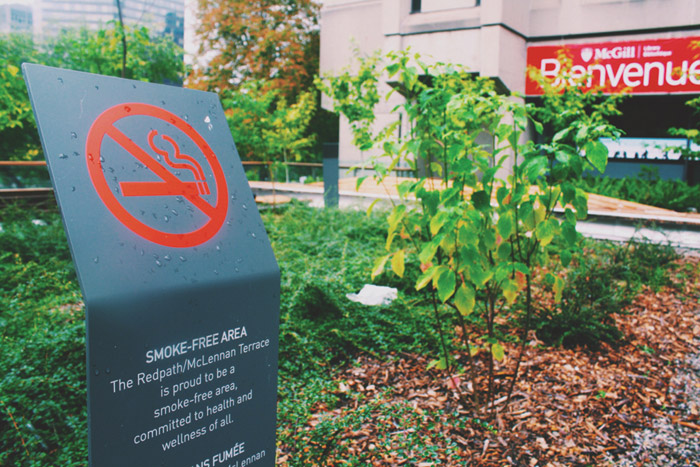Like a category five hurricane making landfall midsummer, swirling clouds of mango-flavoured e-cigarette vapour have descended upon North American university campuses. The vape is becoming as ubiquitous today as cigarettes were 60 years ago. Advertising themselves as safer alternatives to smoking cigarettes, products such as the Juul exploded onto the global market unhindered by the stigma against tobacco products. As one might expect, as the vaping phenomenon has grown, government regulation has inevitably followed. Last year, McGill introduced a new policy that made its campuses largely smoke (and vape)-free. Some applaud the move, while others denounce it as an overreach of authority, but few understand that the policy could not have been avoided given McGill’s legal obligations and economic concerns.
E-cigarettes have become so popular with young people that the companies that manufacture them have been accused of peddling to youth on purpose. Besides the many flavours the pods come in, vapes are both stylish and inconspicuous, while every “hit” carries the promise of a headrush the likes of which no cigarette could ever provide. Nicotine vapes do not contain most of the 69 carcinogens found in tobacco, but the accelerating popularity of e-cigarettes has stimulated concern among medical professionals nonetheless. Not only does one Juul pod have as much nicotine as 20 cigarettes, but the United States Food and Drug Administration (FDA) does not require e-liquid manufacturers to disclose all of the ingredients in their products. This is problematic because research has suggested that some chemicals that are not listed, such as acetals, can cause irritation and other health issues.
The present ambiguity concerning the health risks posed by vaping using e-cigarettes has been a driving force behind regulatory measures. This month, the FDA actually lambasted Juul for illegal marketing practices, alleging that the company broke the law “by selling or distributing them as modified risk tobacco products without an FDA order in effect that permits such sale or distribution”. Moreover, there are so many knock-off products that it’s unclear if people actually know what they’re “hitting.” Suspicious products such as these have been implicated in as many as six deaths in the United States, although many of the vapes in question contained oils containing cannabinoids such as delta-9 tetrahydrocannabinol (THC) and other substances.
McGill is not coming after your Juul just because they want to prevent you from giving yourself cancer: The institution is required by law to do so. Under the Tobacco Control Act, the Act To Bolster Tobacco Control, and departmental guidelines within the Quebec Ministry of Health and Social Services, McGill could not have the power to allow vaping to proliferate even if it wanted to. As a public institution, it must comply with these laws, which require universities to establish a smoke-free environment indoors and in doorways. Students are lucky that they can vape at all.
In addition to having to abide by government law, McGill has a vested economic interest in making sure that it is not associated with the spread of vaping. McGill is public, but it functions as a private institution in that it relies heavily on donations from alumni. Because it manages its own finances, McGill needs to market itself in a certain way to encourage support from donors. Considering the widespread public outcry against vaping, allowing it to proliferate on campus would be detrimental to the university’s public standing.
An outright prohibition on vaping would be nearly impossible to enforce. In fact, while students technically cannot vape everywhere right now, the fact that people still do vape all around campus should serve as a reminder that there is a difference between what the rules say and how they are actually enforced. After all, according to the McGill Tribune’s survey last year, 47 per cent of those who use e-cigarettes do not adhere to the McGill Smoking Policy.
Allowing vaping to go completely unrestrained is unreasonable. Students can still smoke or vape at designated areas, which is better than banning it altogether. McGill gets a bad rep for cracking down on vaping, but the administration is being about as lenient as it can afford to be, considering the legal and practical boundaries it faces.








